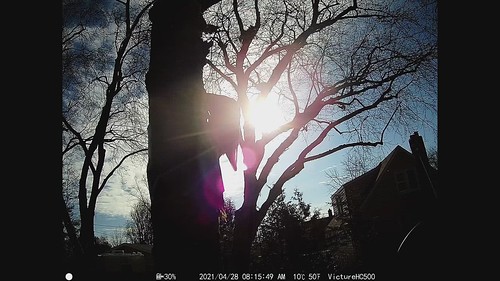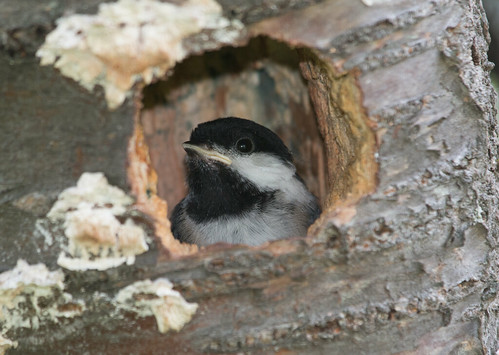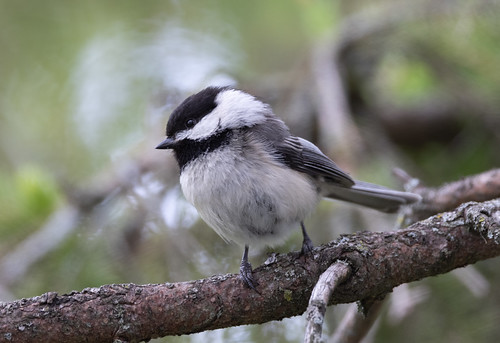Having chickadees nesting in my dead cherry tree where I can observe them a lot of the time turns out to be far more stressful than I’d ever imagined. As a mother when my children were their most vulnerable, and now as a grandmother, my natural overprotectiveness for my own young could be focused on childproofing the house and researching and acting on best practices for keeping a baby safe and happy. But how on earth can one childproof a backyard? As much as I’ve studied chickadees and done everything I can to make my yard safe for them, it’s impossible to foresee what bad things might happen to them.
During their nest-building stage, my trail cam caught a European Starling sticking its head way into the cavity. Chickadees excavate a deep cavity, and there’s no way the starling could have reached it or any eggs within, but it freaked me out. Any nestlings up near the entrance hole could have been killed. And then the starling showed up at the cavity just last week, when starling nestlings are needing more and more protein. Fortunately, the baby chickadees aren’t yet at the stage where they are up by the entrance looking out, but that should happen any day now.
House Sparrows are known to destroy eggs and kill young to steal cavities. These chickadees excavated this hole themselves, which makes it too tiny for sparrows to enter, and House Sparrows don’t live in my neighborhood anyway. But House Wrens are also known to take over occupied cavities, and they’d easily fit in the entrance hole. Wrens are just starting to arrive in this late migration, giving me one more thing to worry about.
Two of my favorite birds, Blue Jays and Crows, will feed their young baby birds of just about any species except their own, and one jay and one crow seem to be keeping track of my chickadee nest. It takes a lot of protein for these large birds to successfully rear young, and tiny songbird nestlings have the exact same moral significance to a parent corvid that caterpillars have for a parent chickadee, but that’s a very hard concept for me to wrestle with. Those little songbird parents grasp the concept of predation completely, putting all their energy into ensuring that their young will not be among the eaten, but those same parents quickly move on and renest if the worst happens. I am not capable of that Zen-like acceptance of how the universe works.
Of course, it isn’t just predation that birds must take in stride. Parasites, dangerous weather events, diseases, and simple freak accidents take a toll, too. It’s not that birds don’t know about these things. They may not understand them in the detail some of us humans do, but they certainly must understand them in the elemental way that that pre-educated cultures did, with or without the superstitions that members of our species attach to scary phenomena we don’t understand or know how to predict.
Most birds, like most people, do everything in their power to protect their young and, like people, sometimes fail. Walking through centuries-old cemeteries, we can see the tragic childhood mortality rates of pre-vaccination eras even when people were eating all-natural diets and enjoying healthy immune systems.
Being all-too-human, I understand the grief people feel when we lose our own loved ones. We often dismiss the grief other human beings suffer in losing their loved ones, especially if those other human beings belong to other cultures, so it’s no mystery why we also dismiss the grief that birds and other wildlife suffer in losing their young. They get on with their lives almost instantly, but that isn’t a choice—it’s the only way they survive. But objective measures of grief in other species, in terms of behavioral and especially physiological responses, turn out to be pretty similar in the species we’ve taken the time and effort to measure.
My backyard chickadees recognize me—I know this because they often fly to the window the moment they see me there, and don’t seem skittish when I’m photographing them at their nest or as they collect food to bring back to the nest. But I very much doubt that they feel any kind of bond to me, certainly not in the way I feel bonded to and protective of them. So as they continue doing their best to keep their young alive and thriving in the only way they know how, I’ll continue doing everything I can, imagining worst-case scenarios, and worrying. I’m only human.




